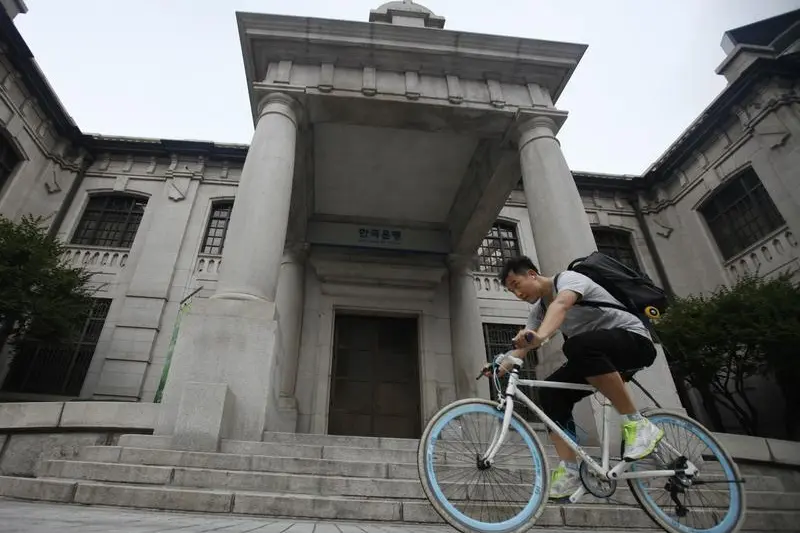PHOTO
South Korea's central bank kept interest rates unchanged on Thursday, retaining a tightening bias on monetary policy as it warned of inflationary risks from the Israel-Hamas conflict and global oil prices.
The Bank of Korea (BOK) said that price pressures would persist and it could take longer for consumer inflation to reach its target level than previously expected.
"Uncertainties increased over global economic growth and inflation compared with the last meeting in August on the prospect of tightening policies lasting longer in major countries and the Israel-Hamas conflict," the BOK said.
The central bank reaffirmed its commitment to maintain a "restrictive policy stance for a considerable time" with an emphasis on ensuring price stability.
The central bank's seven-member monetary policy board unanimously voted to keep the base rate at 3.50%, as expected by all 49 economists polled by Reuters.
Governor Rhee Chang-yong told a press conference one board member sought to leave the door open to adjust the policy rate either way, as risks to growth remain elevated.
"Looking at comments made by board members today, one said (the BOK) should remain flexible to cut (interest rates) as there are both upside and downside risks to growth, while others said inflation control should be our priority as managing inflation expectations and curbing inflation are more important," Rhee said.
The board may consider a rate hike if inflation strays away from the projected path and price expectations become entrenched, he added.
The South Korean economy has taken a hit from a cumulative 300 basis points of rate hikes since August 2021 that has been adding financial stress to households, among the most indebted in the world.
For the BOK, one of the first central banks to raise rates in August 2021, the battle against inflation is complicated by the risks from slowing growth in China, South Korea's biggest trading partner and a key driver of the global economy, as exports have yet to return to growth.
ON HOLD TILL 2024
Some economists feel the central bank is in no rush to loosen given current geopolitical risks.
"My interpretation of today is that the bank is giving more weight on leaving the door open for further tightening as higher oil prices add to inflationary pressure while uncertainties for everything remain high," said Ahn Jae-Kyun, a fixed-income analyst at Shinhan Securities.
The yield on the policy sensitive three-year bond has shot up by nearly a full percentage point from its February low.
Three-year treasury bond futures dropped as much as 0.23 point to 102.32 after the policy statement, but recovered some losses following the governor's revelation that there was one board member who proposed a flexible policy approach.
Governor Rhee had said last week headline inflation would slow to just above 3% by the year-end before eventually reaching the central bank's target of 2% by the end of next year.
Most analysts expect the BOK to hold rates through the first quarter of next year and cut them by 25 basis points to 3.25% in the second quarter of 2024.
The economy grew more strongly than expected in the second quarter by a seasonally adjusted 0.6% in April-June, marking the biggest quarterly growth since the second quarter of 2022.
Inflation, which had eased steadily to 2.3% in July from a peak of 6.3% last year, accelerated for a second month in September amid rising tensions in the Middle East. (Reporting by Cynthia Kim and Jihoon Lee; Editing by Jacqueline Wong)





















